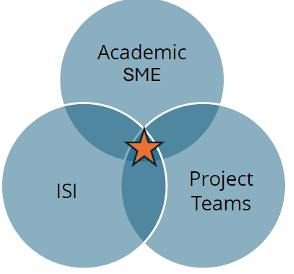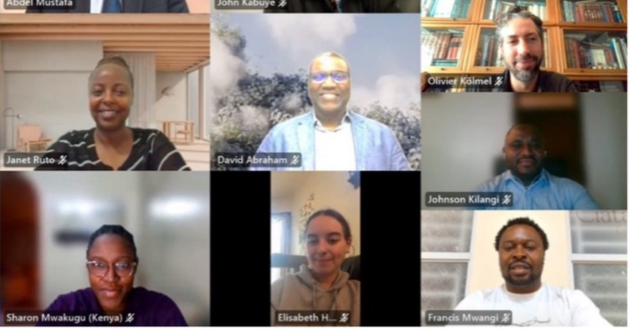In September 2024, the Institute for Sustainable Infrastructure (ISI) launched its pilot for the Technical Assistance Program (TAP), which focuses on helping small and/or economically distressed communities in their efforts to develop more sustainable, resilient, and equitable infrastructure.
What is the Technical Assistant Program (TAP)?
ISI was inspired to formally design and pilot the TAP program after working with a project team in Ethiopia, who registered the first project in Africa to begin applying the Envision framework. The unique experience of working with this project team led ISI to recognize the need to reduce barriers to access and provide greater support for using Envision in economically distressed areas.

Schematic diagram for TAP collaboration
TAP was created to provide infrastructure owners from these small and/or economically distressed communities with better access to resources for guiding more sustainable projects. This includes access to ISI’s own education and training resources, as well as to its network of academic subject matter experts (SMEs) who can provide additional guidance and support. Through this program, participants will collaboratively engage in evaluating practical solutions to complex issues related to sustainability, resilience, and equity using ISI’s Envision Sustainable Infrastructure Framework.
TAP participants will benefit from:
The goals of this program include developing new pathways for equitable access to verification resources, applying principles of sustainability to projects facing real-world challenges, and providing practical experience through which lessons can be learned for future projects.
TAP Pilot Participants
For this TAP pilot, project teams were selected based on the following criteria:
Based on these criteria, two projects were selected for inclusion in the TAP pilot:
- Chala Sustainability Agribusiness Pilot Project (Kenya, East Africa) – This water infrastructure project aims to improve irrigation and food production challenges in arid and semi-arid areas of Kenya. It is owned and led by Miundo Misingi Hub, a public-private partnership infrastructure finance and advisory firm based in Kenya whose vision is to develop and implement innovative and sustainable infrastructure solutions that can be replicated across Africa.
- Konza Technopolis Project (Konza, Kenya, East Africa) – This project consists of several infrastructure projects aimed at improving quality of life and economic prosperity in Kenya. It is a flagship project of Kenya’s Vision 2030 Economic Development Portfolio aimed to create a world-class smart city. This project is owned and led by Konza Technopolis Development Authority (KoTDA).

“Through this program, we can reinforce our commitment to sustainability by ensuring that we enhance our practical skills in the use of the Envision framework to enhance the impact of public-private partnership projects on key stakeholders and the environment,” says Johnson Kilangi, ENV SP, the Founder and CEO of Miundo Misingi Hub. “Specifically, we will leverage TAP to enhance the design and implementation of sustainable irrigation and agricultural projects in arid and semi-arid regions of Kenya.”
John Kabuye Kalungi, ENV SP and ESG and Sustainability Partner with Miundo Misingi Hub agreed, “We believe this is great opportunity to further the relationship between ISI and the sustainability community in Kenya by adopting a common language and understanding of sustainability for infrastructure projects through Envision. There’s also an opportunity here to provide leadership for future infrastructure projects not only in Kenya but also across the region on how they can integrate equity, sustainability, and resilience in the planning, design, construction, and operation of infrastructure projects.”
Similarly, Francis Mwangi, ENV SP and civil engineer with KoTDA sees a strong affinity between Envision and KoTDA’s own focus on sustainability. “Kenya is at the forefront of the adoption of green principles, and Konza Technopolis is leading by using Envision, which can be yet another differentiator for a project like Konza Technopolis.”
These selected TAP project teams will be supported by the following subject matter experts from ISI’s Academic Committee:
These academic partners shared similar reactions as they plan to align the goals and objectives of the TAP initiatives to learning outcomes in their respective programs. For example, Professor Todorova and her students are incorporating their engagement with the TAP projects into a course on urban stormwater management, and she plans to extend the work to the capstone design course in the spring semester. ”My students and I are excited about the opportunity to work with the international partners in the program, contributing our technical expertise to improve sustainable engineering practices in their communities,” says Todorova. “We look forward to the mutual learning that will arise from this partnership.”
Professor Oulton has used Envision in the classroom for a number of years and intends to work with a small multidisciplinary group of graduate students on a TAP project over the entire academic year. “This project will expand on previous classroom engagement projects in both depth and duration,” Oulton says. “In the fall, the students will work towards their ENV SP credentials and become familiar with the verification process. From January through May, students will work with ISI staff and the design professionals and community stakeholders of the project team to help the participating project move toward verification, while gaining experience in project planning and engineering design.”
Professor Todorov said that he anticipates participating TAP projects will benefit from the depth of expertise in construction management his program offers, while his students will gain experience in grappling with practical project challenges tied to costs, project implementation, and risk. Professor Abraham similarly noted that through engagement with TAP, his students will gain a valuable opportunity to appreciate the challenges of applying sustainability principles and theories to actual projects in small and economically distressed communities from both the Global South and North America.
What’s Next for TAP?
Following an initial kick-off meeting in September, the TAP pilot project participants began working on their ENV SP training and credentialing. In January, ISI will host an Applicants Course to prepare these new ENV SPs to apply their knowledge to the Envision verification application process. Preliminary assessments will be conducted early next year, and the project teams will continue to work with their academic mentors to submit their projects for verification following the standard ISI verification process.
“ISI’s mission is to help communities around the world build sustainable, resilient, and equitable civil infrastructure,” says ISI President & CEO, Anthony Kane. “TAP is an excellent opportunity to learn more about how Envision is applied in the context of different socio-political environments and to engage with users who may not otherwise be able to pursue Envision’s third-party verification process. This program will help us figure out how best to get our tools and resources into the hands of these practitioners.”
ISI’s Education Director, Leslie Brunell, is also excited about the opportunity for ISI’s academic network to engage and support real projects in real communities creating real impact around the world. “Envision is an important tool being embraced by the next generation of engineers and planners,” says Brunell. “TAP gives participating faculty and students a chance to share knowledge and gain a better understanding of the challenges that come from applying conceptual ideas in practice.”
The selected TAP pilot project teams have demonstrated commitment to developing sustainable and resilient infrastructure in a way that advances equity and social justice in their communities, and ISI is eager to support and follow their progress. Stay tuned for additional details as the TAP pilot continues next year, laying the groundwork for the potential to offer this program to new communities each year.





